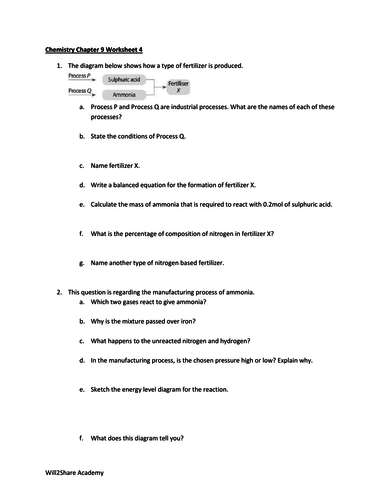






3 Worksheets consisting over 45 questions with answers related to graph analysis, constructing balance equations and application of knowledge of the steps and processes of the Haber Process, Contact Process and Ostwald Process. Bonus questions related to using nitrogenous fertilisers and calculating % of nitrogen to determine fertiliser quality. Suited for students in KS 4.
Get this resource as part of a bundle and save up to 50%
A bundle is a package of resources grouped together to teach a particular topic, or a series of lessons, in one place.
Material Science and Manufacturing Industry Mega Bundle!
A compact classroom consisting of 29 Slides and over 250 questions including all chapters related to manufacturing industry such as the manufacturing process of ammonia and its uses (Haber Process), sulfuric acid and its daily uses (Contact Process) and manufacturing nitric acid (Ostwald Process), calculating the composition of nitrogen in fertilisers and determining the quality of the fertiliser. Material science, the understanding and application of alloys, composition of alloys, advantages of alloys, differences of glass and ceramics, composition of glass and ceramics, advantages of glass and ceramics, types of polymerisation, benefits of polymers, source of polymers and monomers, environmental issues of polymers and solutions, advantages of composite materials, types and applications of composite materials,corrosion and rusting of metals, fibre material, benefits of fibre glass, calculation of the percentage of composition. Concepts of nanotechnology, the use in industry such as semiconductors and electronics, agriculture, textile, food, medicine and cosmetics, the uses of graphene as a nanoparticle with its physical and chemical properties. Green technology segment covers topics in waste management, industrial wastewater treatment, energy and electricity. Questions also include experimental set ups to determine hardness of materials and alloys. Can be used as an alternative to practical in a classroom (theoretical values provided for the alternative). Suited for students in KS4.
Manufacturing Industry Bundle (29 Slides + 7 Worksheets with over 90+ Questions!)
A compact classroom consisting of 29 Slides and 7 Worksheets with over 90+ questions including all chapters related to manufacturing industry such as the manufacturing process of ammonia and its uses (Haber Process), sulfuric acid and its daily uses (Contact Process) and manufacturing nitric acid (Ostwald Process), calculating the composition of nitrogen in fertilisers and determining the quality of the fertiliser, aterial science, the understanding and application of alloys, composition of alloys, advantages of alloys, differences of glass and ceramics, composition of glass and ceramics, advantages of glass and ceramics, types of polymerisation, benefits of polymers, source of polymers and monomers, environmental issues of polymers and solutions, advantages of composite materials, types and applications of composite materials. Content is suitable for 3-4 consecutive lessons. Suited for students in KS4.
Something went wrong, please try again later.
This resource hasn't been reviewed yet
To ensure quality for our reviews, only customers who have purchased this resource can review it
Report this resourceto let us know if it violates our terms and conditions.
Our customer service team will review your report and will be in touch.